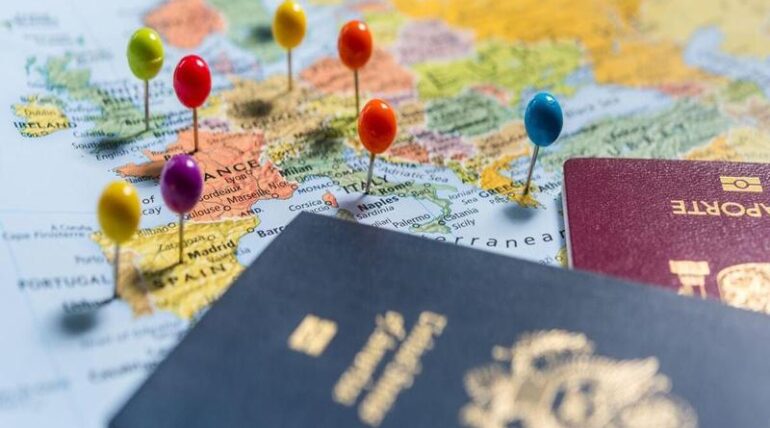
December 22, 2024
Second Citizenship trend is changing how people see borders national identity, and personal chances. What used to be a fringe benefit for just a few is now open to those who want more freedom to move, make money, and feel safe. This article looks at how second citizenship programs are shaping the world’s future. We’ll talk about the chances they create, the problems they bring up, and what they mean for countries and people.
Second Citizenship Trend: Global Mobility and Personal Security
Making it easier to Move around the world and Stay Safe is the main draw of second citizenship with the freedom it gives. For many, being able to travel, live, and work in different countries without worrying about visas is a big reason to get it. This freedom to move is important in a world with political tensions and global problems.
Major benefits of the second citizenship trend:
- You can travel to many countries.
- You get better healthcare and education.
- You have a backup plan if your home country faces political or money troubles. For example, when COVID-19 hit, people with two passports could move to countries with good healthcare and helpful rules.
- Also, second citizenship guarantees that families will be able to live comfortably if conditions in their home countries turn sour again.
Economics Impacts and Marketing Opportunities
CBI programs and, in general, second citizenship solutions have substantial economic effects on the transactions of individuals and countries. Providers of such programs face increased Foreign direct investment while participants in these programs get another opportunity to access fiscal opportunities in the global market.
Benefits to host nations:
- Economic Growth: For many small states, be it St. Kitts and Nevis, or Dominica, such revenues are quite essential as they are derived from CBI programs. These funds are used to build critical leverage infrastructure, reconstruct their homes after natural calamities such as storms, hurricanes, and twisters, and boost tourism and trade.
- Job Creation: They facilitate propositions on real estate, technology, and hospitality to employ the people.
For instance, Dominica’s CBI program generated approximately 26% of the nation’s GDP in the recent past, and such programs are life support mechanisms for small-scale economies.
Benefits to individuals:
- The ability to tap the new economy and the booming markets.
- International opportunities to take the carrying business a notch higher.
- Corporate structuring to take advantage of the reiterated friendly tax laws that many of the countries providing CBI have as a selling point.
Different Aspects of Sociopolitical Action and National Identity
As much as there are benefits that have been witnessed through the second citizenship trend, it has opened up questions on its effect on nation identification and social cohesiveness. Opponents of these programs have posed the danger that through the sale of citizenship, the concept of citizenship, therefore, belonging and loyalty are eroded.
The Challenges of the Second Citizenship Trend:
- Diluted National Identity: The citizens involved may have a lesser attachment to their respective country, they may involve themselves less in the general duty and responsibility to their country.
- Equity Issues: Paid selective pathways for citizenship raise ethical questions since they may cater to the super-rich while forgetting about refugees as well as the migrants struggling to make a living in new countries.
- Furthermore, some countries experience social pressure from people who view second citizenship as a program designed to support the foreigner’s interest at the cost of that nation. So, to promote broad-based participation in these programs while, at the same time, seeking to accrue as much of the potential economic dividends as possible, policymakers have to enter and negotiate these dynamics of development cautiously.
Regulatory Challenges and Security Concerns
A frequent problem is that local regulatory frameworks may not be sufficiently up-to-date to meet the requirements of new entrants, or adequately equipped to address certain security issues.
Modern global society indicates that Second Citizenship programs have emerged as widespread and exploited the weaknesses of legislation and security threats. Governments are becoming increasingly anxious about the potential for these programs to be abused for criminal purposes for example tax evasion or money laundering.
Future Outlook
As the second citizenship trend is becoming essential for playing a significant role in the global landscape, opportunities and risks that are associated with it depend greatly on governments implementing rational strategies. This expansion is anticipated to grow over the years as new technologies, internationalization, and climate change impact mobility.
Emerging Trends in the Second Citizenship Programs
- Digital Nomadism: The increasing adoption of remote work is creating a need for citizenships that provide opportunities for accessing various areas in a given country or other countries without limitations.
- Climate Refugees: With global warming on the increase, second citizenship can act as a rescue channel for citizens in areas experiencing extreme effects of climate change.
- Technological Integration: For more assured transparency, different blockchain technologies are being investigated to improve CBI programs’ security and operations.
Policy Recommendations
To maximize the benefits while mitigating risks, governments must:
- Use strict applicability processes when selecting newcomers into the organization.
- Ensure the transparency of funds in their usage.
- It is important to make certain that programs are suited to the clients and effectively respond to minorities.
Shaping a Borderless World
The second citizenship trend is not simply a mechanism for individual circulation since they are reconfiguring the world we live in. Although second citizenship program structures give individuals unprecedented freedoms, they impose new challenges about sovereignty, identification, and defense on nations. The fate of these programs rests with trying to optimize the policies for globalization and the policies for the protection of the nation. When balanced and driven by attention and respect for different needs, second citizenship can represent a huge step to a stronger, more connected world.